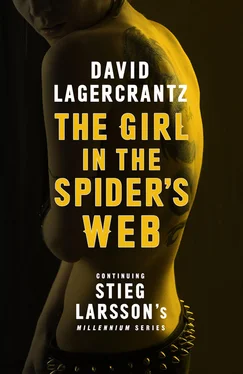“You were talking about the woman from the Centre for Autism.”
“That’s right. She smelled a rat and called Hanna and Westman and was informed that everything was fine. But she had a feeling that wasn’t true. So against normal practice she made an unannounced home visit and, when they finally let her in, she could tell that the boy was not doing well, that his development had stagnated. She also saw those bruises. So she rang Balder in San Francisco, had a long conversation with him and soon after that he moved back and took his son with him to his new house in Saltsjöbaden, disregarding the custody order.”
“How did he manage that, seeing as Westman was so keen to get the child support?”
“Good question. According to Westman, Balder more or less kidnapped the boy. But Hanna has a different version of the story. She says that Frans turned up and seemed to have changed, so she let him take August. She even thought he would be better off with his father.”
“And Westman?”
“According to her, Westman was drunk and had just landed a big part in a new T.V. production, and was feeling cocky and over-confident. So he agreed to it. However much he may have gone on about the boy’s welfare, I think he was glad to be rid of him.”
“But then?”
“Then he regretted it, and on top of everything else he was sacked from the series because he couldn’t stay sober. He suddenly wanted to have August back, or not so much him, of course...”
“The child support.”
“Exactly, and that was confirmed by his drinking pals. When Westman’s credit card was rejected during the course of yesterday evening, he really started ranting and raving about the boy. He bummed five hundred kronor off a young woman in the bar to pay for a taxi to Saltsjöbaden in the middle of the night.”
Bublanski was lost in his thoughts for a while and gazed once again at the photograph of Modig’s son.
“What a mess,” he said.
“Right.”
“Under normal circumstances we would be close to solving this one. We’d find our motive somewhere in that custody battle. But these guys who hack alarm systems and look like ninja warriors, they don’t fit the picture.”
“No.”
“There’s something else I’m wondering about.”
“What’s that?”
“If August can’t read, then what was he doing climbing up to reach those books?”
Blomkvist was sitting opposite Farah Sharif at her kitchen table with a cup of tea, looking out at Tantolunden park. Even though he knew it was a sign of weakness, he wished he did not have a story to write. He wished he could just sit there without having to press her for information.
She did not look as if talking would do her much good. Her whole face had collapsed and the intense dark eyes, which had looked straight through him at the front door, now seemed disoriented. Sometimes she muttered Balder’s name like a mantra or an incantation. Maybe she had loved him. Farah was fifty-two years old and a very attractive woman, not beautiful in a conventional way surely but with a regal bearing. He had surely loved her .
“Tell me, what was he like,” Blomkvist said.
“Frans?”
“Yes.”
“A paradox.”
“In what way?”
“In all sorts of ways. But mainly because he worked so hard on the one thing which worried him more than anything else. Maybe a bit like Oppenheimer at Los Alamos. He was engrossed in something he believed could be our ruin.”
“Now you’ve lost me.”
“Frans wanted to replicate biological evolution on a digital level. He was working on self-teaching algorithms — the idea is they can enhance themselves through trial and error. He also contributed to the development of quantum computers, as people call them, which Google, Solifon and the N.S.A. are working on. His objective was to achieve A.G.I., or Artificial General Intelligence.”
“And what is that?”
“It’s when something has the intelligence of a human being, but the speed and precision of a computer. If a thing like that could be created, it would give us enormous advantages within numerous fields.”
“No doubt about it.”
“There is an extraordinary amount of research going on in this area, and even though most scientists aren’t specifically aiming for A.G.I., competition is driving us in that direction. Nobody can afford not to create applications which are as intelligent as possible. Nobody can afford to put the brake on development. Just think of what we have achieved so far. Just think back to what you had in your mobile five years ago compared to what’s in there today.”
“True.”
“Before he became so secretive, Frans told me he estimated that we could get to A.G.I. within thirty or forty years. That may sound ambitious, but for my part I wonder if he wasn’t being too conservative. The capacity of computers doubles every eighteen months, and the human brain is bad at grasping that kind of exponential growth. It’s like the grain of rice on the chessboard, you know? You put one grain of rice on the first square, two on the second, four on the third, eight on the fourth.”
“And soon the grains of rice have flooded the world.”
“The pace of growth goes on increasing and in the end it escapes our control. The interesting thing isn’t actually when we reach A.G.I., but what happens after that. Just a few days after we’ve reached A.G.I., we’ll have A.S.I. — Artificial Super-Intelligence — used to describe something more intelligent than we are. After that it’ll just get quicker and quicker. Computers will start enhancing themselves at an accelerating pace, perhaps by a factor of ten, and become a hundred, a thousand, ten thousand times cleverer than we are. What happens then?”
“I dread to think.”
“Quite. Intelligence in itself is not predictable. We don’t know where human intelligence will take us. We know even less what will happen with a super-intelligence.”
“In the worst case we’ll be no more interesting to the computer than little white mice,” Blomkvist said, thinking of what he had written to Salander.
“In the worst case? We share 90 per cent of our D.N.A. with mice, and we’re assumed to be about one hundred times as intelligent. Only one hundred times. Here’s something completely new, not subject to these kinds of limitations, according to mathematical models. And it can become perhaps a million times more intelligent. Imagine that.”
“I’m certainly trying to,” Blomkvist said with a careful smile.
“I mean, how do you think a computer would feel when it wakes up to find itself captured and controlled by primitive little creatures like us. Why would it put up with that?” she said. “Why on earth should it show us any consideration, still less let us dig around in its entrails in order to shut down the process? We risk being confronted by an explosion of intelligence, a technological singularity, as Verner Vinge put it. Everything that happens after that lies beyond our event horizon.”
“So the very instant we create a super-intelligence we lose control, is that right?”
“The risk is that everything we know about the world will cease to be relevant, and it’ll be the end of human existence.”
“You are joking.”
“I know it sounds crazy, but it’s a very real question. There are thousands of people all over the world working to prevent a development like this. Many are optimists, or even foresee some kind of utopia. There’s talk of friendly A.S.I., super-intelligences which are programmed from the start to do nothing but help us. The idea is something along the lines of what Asimov envisioned in his book I, Robot : built-in laws which forbid the machines to harm us. The writer and innovator Kurzweil has visions of a wonderful world in which nanotechnology allows us to integrate ourselves with computers, and share our future with them. But there are no guarantees. Laws can be repealed. The intent of initial programming can be changed and it’s fatally easy to make anthropomorphic mistakes: to ascribe human characteristics to machines and misunderstand what drives them inherently. Frans was obsessed with these questions and, as I said, he was of two minds. He both longed for intelligent computers and he also worried about them.”
Читать дальше












